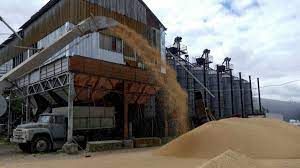Before talks on a revived grain export deal, Russia attacks the port of Odesa in Ukraine
During a nocturnal assault, Russian soldiers conducted a number of drone assaults on the southern Ukrainian city of Odesa, according to authorities on Sunday. The attack against port facilities on the Danube River lasted more than three hours and used around twenty drones. At least two people were wounded in the assault, according to Ukrainian officials, while 22 out of 25 attack drones were successfully shot down by the Ukrainian Air Force.
Andriy Yermak, the chief of staff of Ukrainian President Volodymyr Zelenskyy, described the event as an effort to “provoke a food crisis and hunger in the world.” The incident is seen as a component of Russia’s larger campaign to disrupt the global food supply system. Moscow has not yet responded to the strike, but according to the AP, artillery fire was heard in eight communities around the area.
Explosions were reportedly seen in the port city of Reni on the Danube, close to Romania, according to local Ukrainian media. After Russia withdrew from the Black Sea grain accord in July and resumed its blockade of major Ukrainian ports along the Black Sea, notably Odesa, The New York Times reported that the Danube River had become a crucial alternative conduit for grain supplies.
In response to these assaults, Ukraine created a temporary passageway along the western Black Sea coast, allowing civilian ships that were stuck in Ukrainian ports as a result of Russia’s invasion to pass. Despite the difficulties, a few boats have recently traveled this route successfully.
These assaults took place while international attempts to restore the grain agreement continued, with Russia putting out a different accord from the one that had been negotiated by the UN and Turkey. President Vladimir V. Putin and Prime Minister Recep Tayyip Erdogan will debate the Russian proposal on Monday during their bilateral meetings in the Black Sea resort of Sochi. Moscow has voiced concerns about the pact’s execution, despite the fact that the initial accord had significantly contributed to stabilizing food prices globally.







